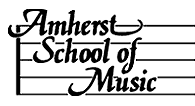

Director's Corner
Contact the Director of the ASM, Steven Bianchi at sabianchi@aol.com Presently there are three articles available followed.
Frederic Chopin | How to Help Children Practice | Performance Etiquette
Frederic Chopin
He wrote predominantly in a salon style, which means shorter musical forms often of a programmatic Romantic nature. Most of his works are miniatures that are highly poetic and lyrical in nature. When one considers the sounds Chopin grew up with, the music of the late Classical period, one realizes the enormously revolutionary scope of Chopin’s style. The advent of the damper pedal on the piano, and the music of the Romantic Irish composer John Field both contributed to the style of Chopin’s music. What is utterly amazing is that his first book of 12 etudes, opus 10, is beautiful, difficult and revolutionary. This work changed the course of piano history and he wrote it at the age of eighteen! Not only did he change the course of piano music by innovating new textures, harmonies and technical demands, but he reached levels of beauty that have never been surpassed, a true sign of genius. Another unsurpassed aspect of this composer is that virtually every piece he composed is acceptable on the concert stage. Listening to or playing his music never ceases to amaze me. The sheer depth of beauty found within every measure of his compositions. The poignant, comprehensive pursuit of the inner most feelings of the human drama inspired an incomparable music. This style had an effect on the other Romantic composers of his day and of subsequent generations. Also, his style had an influence on popular ballad songs of contemporary and popular music. I recommend, for first time listeners, recordings of his Nocturnes. However, literally anything with his name on it will make for pleasurable listening. For burgeoning pianists it could prove to be quite inspirational.
How to Help Children PracticeThis area is designed to help the parents and students of music study to effectively organize and fully appreciate the time of their practice sessions. First of all, we must start with the idea that practicing should take place everyday. Music study parallels language study. It must be a daily pursuit. Since music lessons are held usually once a week, if nothing constructive happens between lessons, progress will be extremely slow. Imagine having your child study math with a teacher for only one session a week for 30 minutes, with no homework between lessons. Progress would be extremely slow. This will also happen if the student of music does not practice daily. Some of the benefits, for beginners, of practicing everyday are: quicker fluency and recognition of names of notes and rhythms, quicker development of the necessary motor action for playing your instrument, and quicker participation in the beautiful experience of making music effortlessly. Suggestions for attaining an effective practice routine:
Performance EtiquetteParticipation in a performance class or recital involves more than just practicing your pieces carefully. It also involves understanding the proper etiquette while attending the event. Please try these suggestions:
|


 The Director’s Corner features articles written by Steven Bianchi that could be of interest to those studying music (and their parents). The subjects include articles about practicing, composers and the world of music.
The Director’s Corner features articles written by Steven Bianchi that could be of interest to those studying music (and their parents). The subjects include articles about practicing, composers and the world of music. Frederic Chopin (1810-1849) is one of the foremost composers of music for the piano. His music is categorized under the general heading of Classical music, but the more specific period of music he represents is the Romantic period. Born in Poland, of French and Polish parents, this highly acclaimed youngster left Poland in 1830, never to return, and made his home in Paris, France. War torn Poland often found a place in his musical themes. Also, majestic, proud, sorrowful, sentimental and folk themes are found throughout most of his compositions.
Frederic Chopin (1810-1849) is one of the foremost composers of music for the piano. His music is categorized under the general heading of Classical music, but the more specific period of music he represents is the Romantic period. Born in Poland, of French and Polish parents, this highly acclaimed youngster left Poland in 1830, never to return, and made his home in Paris, France. War torn Poland often found a place in his musical themes. Also, majestic, proud, sorrowful, sentimental and folk themes are found throughout most of his compositions.